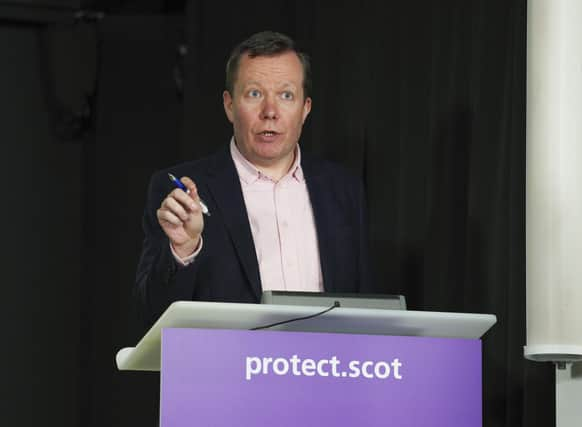R number too high for circuit breaker to work, says Scottish expert


National clinical director Professor Jason Leitch said such measures tend to work best when the R number - the average number of people infected by each person who contracts Covid-19 - is just above one.
He said in those circumstances, a circuit breaker lockdown - during which people are required to largely stay at home for a period of two to three weeks - can be the "boost" needed to bring the R number below one.
Advertisement
Hide AdAdvertisement
Hide AdFirst Minister Nicola Sturgeon said last week the R number in Scotland was possibly as high as 1.6.
Prof Leitch said that was "a little bit higher" than the level it should be for a temporary lockdown to be the most effective option.
He said while "nobody is suggesting" another full national lockdown, as happened in March, he warned tougher restrictions may be needed.
Speaking on BBC Radio Scotland's Good Morning Scotland programme this morning, Prof Leitch said: "The two big bullet points that are possible are travel and places where people mix.
"The key risk remains household mixing and you can see that in pretty much every outbreak, every positive case we get."
On a circuit breaker lockdown, he said it could be implemented if it was thought such a measure might be a "kind of pain for gain".
But he added: "The problem is the science seems to suggest it works best if your R is only just above one, because it gives you a little boost to get it below one.
"We're worried we're a little bit higher than that, so that needs a little bit of modelling and a little bit of work, because there is less point in going from 1.7 to 1.5 then there would be from going from 1.1. to 0.8, for instance. You can see why that would be more advantageous."
Advertisement
Hide AdAdvertisement
Hide AdBut he said "none of these decisions are straightforward", as he told how cases of coronavirus are still growing in Scotland.
"We have had 3,600 cases in the last seven days, even if you isolate out the particular clusters in universities we are still accelerating," he warned.
Professor James Chalmers, the British Lung Foundation chairman in respiratory research at the University of Dundee, told the same programme a circuit breaker could only be a temporary solution.
He said: "The only problem with a circuit breaker is that it's sort of acknowledging that with normal restrictions, with the restrictions we have at the moment, we can't get that R number below one and so you are sort of saying in the future we're going to have to have other circuit breakers to do the same thing.
"So in an ideal world I'd like to see the current restrictions getting the R number below one so that we know that we can live with this virus sustainably over a period."
He said while a circuit breaker could "drop the R number", as soon as it ends "we go back to the same measures that we have at the moment and the R number is above one, the cases will just rise again".
Comments
Want to join the conversation? Please or to comment on this article.